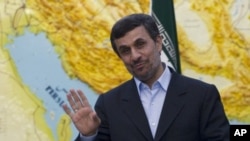Iranian conservative critics of President Mahmoud Ahmadinejad have defeated his supporters in most of the parliamentary seats whose winners have been declared in the country's parliamentary election.
Iran's state-run Press TV news agency said Sunday results have been declared for more than 200 of parliament's 290 seats following Friday's vote. More than half of the winners are conservatives who support Supreme Leader Ayatollah Ali Khamenei and oppose the policies of President Ahmadinejad. The president angered Khamenei loyalists last year for challenging the supreme leader's authority in appointments of top officials.
Prominent Khamenei loyalists who won seats include parliamentary speaker Ali Larijani and Gholam Ali Haddad Adel, whose daughter is married to the supreme leader's son. Results show Ahmandinejad's conservative critics also won a big majority of seats in rural regions where he had performed well in previous elections.
The president's sister, Parvin, was a notable loser, failing in her bid to win a seat.
Iran's government said 30 seats will have to be decided in run-off elections in the coming weeks. Results for the remaining seats were expected by Monday.
Iran's main reformist opposition leaders boycotted Friday's vote. Most of them have been jailed, put under house arrest or otherwise banned from running for office by Iran's conservative government and ruling clerics. Partial results showed only one reformist being elected, with Alireza Mahjoub retaining his seat in Tehran.
Reformists staged mass protests against Ahmadinejad's 2009 re-election, claiming it was rigged. The government denied the charge and violently suppressed the protests.
Since 2009, the president has seen Iran's dominant conservative movement splinter into factions that support him or reject him for challenging the supreme leader and presiding over a weakening economy. Ahmadinejad's critics in the outgoing parliament plan to summon him for an unprecedented public questioning about his policies in the coming week.
Iranian conservative leaders had appealed for a high turnout in Friday's vote, hoping to boost their legitimacy in the aftermath of the disputed 2009 presidential contest. Iran's government put the turnout rate for the parliamentary election at 64 percent, a significant increase over the 57-percent rate for the previous vote in 2008. Iran did not permit foreign observers to monitor the latest turnout or the vote-counting process.
Photo Gallery: Iran - after elections
Some information for this report was provided by AP, AFP and Reuters.
| Join the conversation on our social journalism site - Middle East Voices. Follow our Middle East reports on Twitter and discuss them on our Facebook page. |




